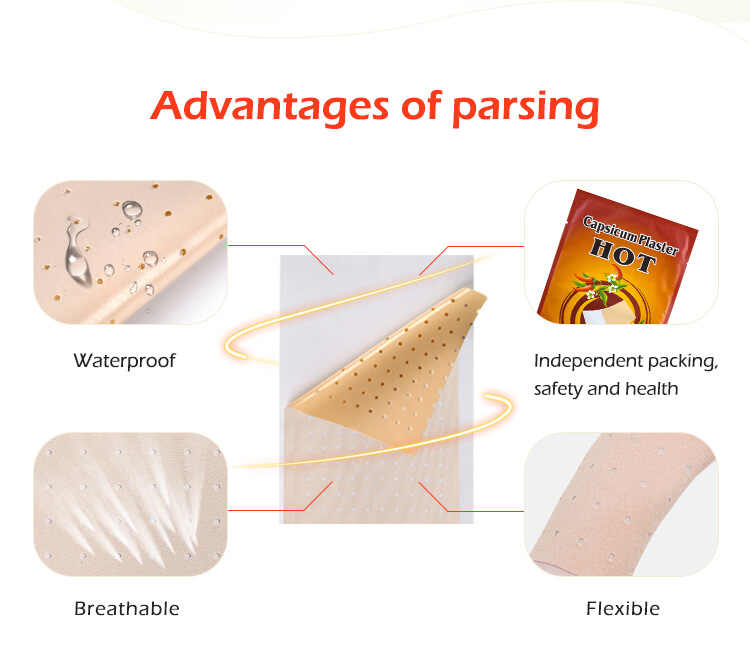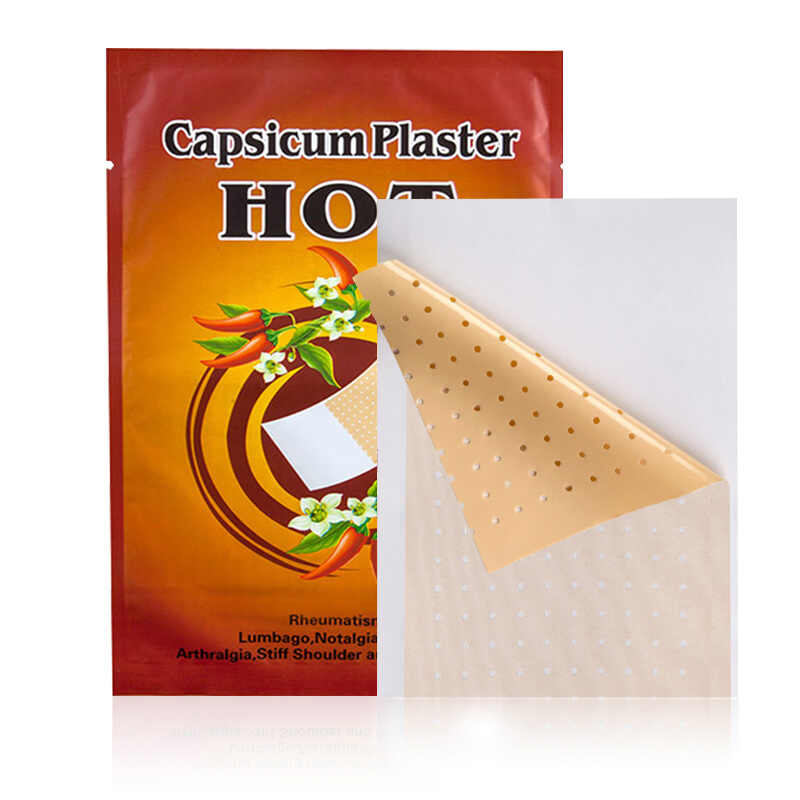What Is Driving the Popularity of Herbal Capsicum Patches in 2025?
Exploring the Surge in Demand for Herbal Capsicum Patches and the Role of OEM, Customization, and Private Label Solutions
Introduction
In 2025, the global wellness and pain management market continues to evolve, with Herbal Capsicum Patches standing out as one of the fastest-growing product segments. These transdermal patches, infused with natural capsicum extract, are gaining unprecedented traction across various regions, from Asia-Pacific to North America and Europe. Whether you are a Herbal Capsicum Patches Manufacturer, a startup exploring Private Label Herbal Capsicum Patches, or a brand seeking Custom Herbal Capsicum Patches through OEM services, the growing popularity signals a clear market opportunity.
But what exactly is fueling this demand surge? This article dives deep into the trends, consumer behaviors, and strategic developments that are making Herbal Capsicum Patches a global health product phenomenon in 2025.

1. Rising Demand for Natural and Non-Invasive Pain Relief
As consumers grow increasingly health-conscious and wary of synthetic drugs, there's a notable pivot toward natural pain relief alternatives. Herbal Capsicum Patches use capsaicin — a compound derived from chili peppers — which is well-known for its ability to reduce joint, muscle, and nerve pain by blocking pain signals.
Unlike oral medications, these patches are non-invasive, avoid gastrointestinal side effects, and deliver targeted relief, making them highly attractive to aging populations, athletes, and office workers alike.
2. Technological Innovations in OEM Production
Herbal Capsicum Patches OEM manufacturing is not what it used to be. Advanced transdermal delivery systems now allow for sustained and controlled release of herbal ingredients. Leading Herbal Capsicum Patches Manufacturers have adopted new-generation polymer matrices and skin-adhesion technologies to ensure better performance and comfort.
OEM capabilities now include:
Extended wear patches (12 to 24 hours)
Hypoallergenic formulations
Customized formulations based on client specifications
Eco-friendly and biodegradable packaging options
These innovations allow Custom Herbal Capsicum Patches to stand out in a crowded marketplace, especially when paired with powerful branding strategies.
3. Growth of Private Label Wellness Brands
The Private Label Herbal Capsicum Patches market is booming. Entrepreneurs, wellness brands, and even pharmacies are launching their own labels by partnering with experienced Herbal Capsicum Patches OEM providers. This approach allows brands to:
Enter the market quickly
Customize the look and feel of the product
Maintain high quality without investing in production infrastructure
Private labeling is particularly effective in e-commerce, where differentiation in packaging, branding, and messaging can significantly influence buying behavior.
? Example: A wellness brand can work with a Herbal Capsicum Patches Manufacturer to produce a lavender-infused capsicum patch targeted at sleep-deprived users — combining pain relief and aromatherapy in a niche SKU.
4. Increased Consumer Education and Trust
Thanks to health influencers, online content, and scientific publications, more consumers now understand how capsaicin works to alleviate pain. They are actively searching for products that are natural, science-backed, and user-friendly. Herbal Capsicum Patches perfectly match this expectation.
Many Herbal Capsicum Patches Suppliers now provide detailed product documentation, clinical trial summaries, and user guides — tools that both B2B buyers and consumers rely on to make informed decisions.
5. Market Expansion Through E-Commerce and Global Distribution
The global distribution of Herbal Capsicum Patches has become easier with the rise of platforms like Amazon, Alibaba, and Shopify. Many Herbal Capsicum Patches OEM providers support international shipping, white labeling, and compliance with regional standards like FDA (USA), CE (Europe), and CFDA (China).
This accessibility has made it easier than ever for wellness businesses to scale, especially when working with a full-service Herbal Capsicum Patches Supplier that handles packaging, documentation, and export certifications.
6. Demand for Customization and Niche Applications
2025 consumers no longer want generic solutions. There is growing demand for Custom Herbal Capsicum Patches tailored to specific needs such as:
Sports recovery
Menstrual pain relief
Elderly care
Office fatigue
Manufacturers now offer customization in:
Active ingredients (e.g., adding menthol, turmeric, or CBD)
Patch size and shape
Fragrance or scent
Skin sensitivity options
This rise in demand gives OEMs and suppliers a unique chance to lead in niche verticals.
7. Sustainability and Clean Label Trends
In line with global sustainability goals, eco-conscious consumers are demanding clean-label products — those free from parabens, artificial preservatives, and non-recyclable packaging.
Many leading Herbal Capsicum Patches Manufacturers are now certified organic, cruelty-free, and committed to using biodegradable materials. These attributes add significant marketing value, especially for Private Label Herbal Capsicum Patches looking to build trust and credibility quickly.
8. Regulatory Support and Market Legitimization
Governments and regulatory bodies are increasingly supportive of herbal-based solutions. Capsicum-based patches have received favorable classification in many jurisdictions, and reputable Herbal Capsicum Patches OEM providers offer full regulatory documentation, making market entry smoother for new brands.
This legitimacy is especially crucial in competitive markets such as the USA, EU, and Southeast Asia, where health supplements and medical devices face tight scrutiny.
9. Affordable Entry for Startups and Small Brands
With low Minimum Order Quantities (MOQs) now available through many Herbal Capsicum Patches OEM channels, even small brands can enter the market without excessive capital investment. This democratization of product development is fueling a new wave of innovation and competition — further increasing product visibility and popularity.
10. Social Proof and Viral Marketing
The aesthetic appeal of Herbal Capsicum Patches — discreet, easy to use, and clean — makes them highly "Instagrammable." Influencers in the health, fitness, and wellness sectors often promote these patches, helping them go viral.
Positive reviews and testimonials drive organic demand, especially when the product comes from a trusted Herbal Capsicum Patches Manufacturer or a reliable Herbal Capsicum Patches Supplier with a reputation for consistent quality.
Conclusion
The popularity of Herbal Capsicum Patches in 2025 is the result of a perfect storm: growing demand for natural pain relief, innovation in OEM manufacturing, consumer trust, private label opportunities, and digital market expansion. For businesses looking to enter or expand in the wellness market, investing in Custom Herbal Capsicum Patches or launching a Private Label Herbal Capsicum Patches brand through a qualified Herbal Capsicum Patches Manufacturer or Supplier is a strategic move backed by strong market fundamentals.
Related Questions and Brief Answers
1. Why are Herbal Capsicum Patches more popular than traditional ointments?
They offer targeted, mess-free pain relief with sustained effect and greater convenience.
2. Can I start my own brand with a small MOQ?
Yes, many Herbal Capsicum Patches OEM providers offer low MOQs ideal for startups and small businesses.
3. What are the benefits of private labeling Herbal Capsicum Patches?
You gain brand control, faster market entry, and reduced R&D costs while offering a trusted product.
4. Are Herbal Capsicum Patches safe for sensitive skin?
Leading Herbal Capsicum Patches Manufacturers provide hypoallergenic and dermatologically tested options.
5. Can I customize the formula for niche markets?
Absolutely. Custom Herbal Capsicum Patches can be tailored in terms of ingredients, patch size, scent, and more.
6. How can I find a reliable Herbal Capsicum Patches Supplier?
Look for suppliers with certifications (GMP, FDA, CE), a strong portfolio, and positive client reviews.
7. What certifications should I request from an OEM manufacturer?
GMP, ISO, FDA/CE (depending on region), MSDS, and product safety data are essential.






